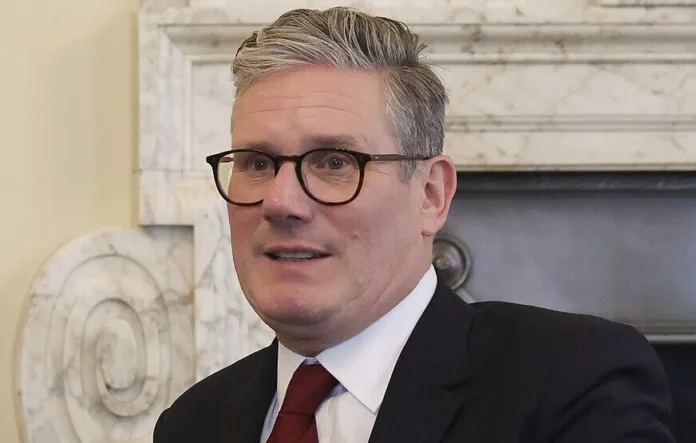As approval ratings plummet, Keir Starmer struggles to navigate a series of public relations disasters and internal conflicts
This week has been a turbulent one for Prime Minister Keir Starmer, whose approval ratings now sit perilously low, trailing only Liz Truss in recent memory. Critics are left to wonder if the leader of the Labour Party is truly aware of the predicament he finds himself in or if he’s simply digging himself deeper into a political hole.
Starmer’s issues began with his perceived need for luxury, as evidenced by his collection of designer eyewear valued at nearly £2,500. His defensive stance on receiving hospitality and freebies raises eyebrows, particularly as he navigates the murky waters of public scrutiny. His melodramatic claims—like vowing never to attend an Arsenal game again due to hospitality concerns—only serve to amplify the absurdity of his situation.
As the narrative unfolds, Starmer’s handling of a brewing internal conflict within his team further complicates matters. The tension among his staff, including a chief of staff whose salary now surpasses Starmer’s own, has created a chaotic environment that echoes the most dramatic political scandals. When Starmer declared he was “completely in control” during an interview, it rang hollow, reminding observers of similar misplaced confidence from past political figures.
Embed from Getty ImagesThe controversy surrounding Starmer’s choice of donors—particularly Lord Alli, who supplies the Prime Minister with high-end fashion—compounds the issue. Critics question what it says about Starmer’s judgment and priorities when he aligns himself with affluent figures, particularly in light of the cost-of-living crisis affecting many citizens.
As the budget deadline approaches, Starmer faces mounting pressure. He has repeatedly delayed discussions on the impending fiscal challenges, opting instead to maintain a vague air of optimism. This strategy has backfired, creating anxiety among the public and business sectors alike, as they await clarity on potential austerity measures.
The juxtaposition of Starmer’s public image—often sombre and serious—with his private indulgences has left many feeling uneasy. It reinforces a long-standing perception that Labour politicians are extravagant when it comes to spending other people’s money, a notion that could severely undermine Starmer’s credibility.
Recent Ipsos polling reveals that half of British voters are disappointed with Labour’s governance thus far, with Starmer’s approval ratings trailing behind those of all but the most infamous leaders. This dire outlook may be compounded by the looming budget, which is expected to reveal the harsh realities of economic policy.
Starmer’s situation illustrates the challenges of political leadership in a time of economic uncertainty. With rising discontent among the electorate and internal conflicts threatening his leadership, the Prime Minister must navigate a delicate path if he hopes to regain public trust.
Analysis:
Political:
Starmer’s struggles highlight the precarious nature of political leadership, particularly within a party that has historically faced challenges related to public perception and economic management. His declining approval ratings suggest a disconnect between his policies and the expectations of the electorate, raising questions about his ability to effectively govern during a critical juncture.
Social:
The public’s reaction to Starmer’s lavish lifestyle amid economic struggles underscores a broader societal debate about privilege and responsibility. In a time when many are grappling with financial hardship, the perception that leaders are out of touch can create significant backlash, fostering distrust in political institutions.
Gender:
Starmer’s challenges also speak to gender dynamics within politics. The scrutiny faced by leaders, particularly men, often contrasts with the expectations placed on female leaders, revealing systemic biases in how political figures are evaluated. This context is crucial for understanding the pressures Starmer faces in maintaining his leadership.
Economic:
The impending budget and Starmer’s handling of public funds are central to the current discourse. With significant economic challenges on the horizon, how he addresses these issues will be pivotal in shaping public sentiment. The juxtaposition of his lifestyle against the backdrop of economic austerity may lead to long-term consequences for his leadership and the Labour Party’s future.
In conclusion, Starmer’s tumultuous week serves as a microcosm of broader political challenges. The confluence of luxury and austerity, alongside internal strife, paints a complex picture of leadership in crisis. As public expectations shift, Starmer must adapt or risk losing the support he desperately needs.
